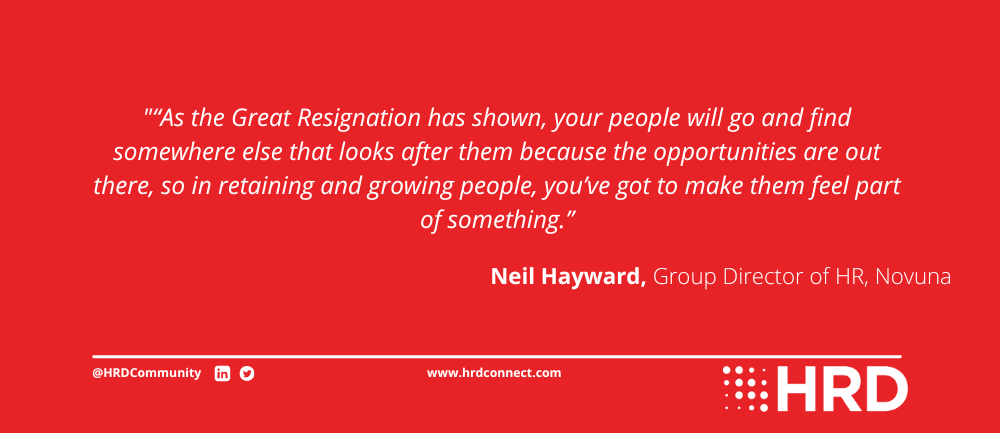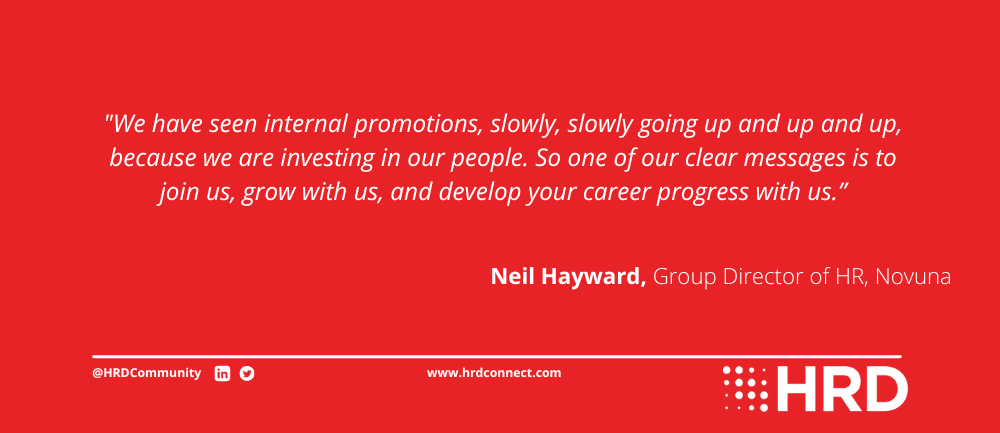-
Provided by

- Date published: Mar 7, 2023
- Categories
What is it to feel like you belong at your company? To know that your employer values not just the work that you do for it, but your overall commitment to them, and in turn demonstrates a similar commitment back?
In the wake of the pandemic, the absence of such strong bonds between employer and employee, gave rise to the so-called Great Resignation, with employees across sectors, questioning their career choices, and deciding to pursue new paths.
In the UK, this saw 4 million workers quit their jobs by April 2021, and a further 400,000 join them by that September, according to official statistics.
By May of the following year, almost one-fifth of employees (18%) said they were ‘very’ or ‘extremely’ likely to switch to a new employer within the next year, and a further 32% stating they were moderately likely, according to a survey by PwC.
While pay unsurprisingly emerged as the main driving force behind the resignations, reported as a factor by 72%, it was closely followed by more emotive factors, with 68% of respondents wanting a more fulfilling job, and 63% saying they wanted to truly be themselves at work.
So the emergence of the Great Resignation suggested that there was also a great reflection, where people questioned whether their employers, and what they employed them to do, were really where they truly saw themselves.
But as much as the pandemic saw bonds broken and contracts canceled within companies, so too did it lead to others emerging stronger than before, with a renewed sense of purpose and commitment to staff.
A company that appears to have proven itself particularly adept at navigating these challenges in the past few years is the UK-based financial services provider Novuna.
Ranked as one of the 50 Best Places To Work In The UK by the employee review site Glassdoor for two consecutive years, and currently, the highest ranked UK-headquartered financial services firm, Novuna has proactively and persistently put a focus on employee wellbeing.
Speaking to HRD Connect, Neil Hayward, group director of HR at Novuna, explains that as challenging as the past three years have proven, first with the pandemic and then more recently with the cost-of-living crisis, they have also shown just how important it is put employees needs and wellbeing at the heart of everything.
“I think any organization that has been able to go through the last three years has certainly had to put their employees at the forefront of what they are doing, and I think in that respect, it’s a new dimension for us,” he explains.
“As the Great Resignation has shown, your people will go and find somewhere else that looks after them because the opportunities are out there, so in retaining and growing people, you’ve got to make them feel part of something.”

Providing support in challenging times
This sense of team spirit and work ethic is something that Hayward and his CEO, Robert Gordon, were keen to make the most of since the beginning of the pandemic, when the first national lockdown was implemented.
With all of the offices closed and staff having to get to grips with working from home while dealing with the other challenges presented by the pandemic, they established a daily update from Gordon in the form of a blog that provided key information and technical updates for all staff, but also reassurance.
This included Gordon reflecting on his own experiences of transitioning to remote working and how we was finding ‘the new normal’, but it was also used as a valuable means of relaying what the company was doing in order to navigate the bigger challenges that were starting to emerge, such as ensuring financial sustainability.
These early measures that Novuna took to protect their staff included holding back on recruitment in order to protect its existing workforce, but also on finding ways to ensure that those whose jobs were most heavily impacted by the closure of the offices, were still kept busy by finding them new responsibilities and duties.
“We set up some initial stages and strong reassuring steps about what the business would do to ensure job security,” explains Hayward. “So that may have meant taking some tough decisions early on about holding back on recruitment to protect our existing workforce, but also about finding new responsibilities for those whose work was most heavily impacted by the office being closed, such as for receptionists.”
These measures, initially taken during the pandemic, have also been followed up more recently in order to offer further protection with the current cost of living and high-inflation environment, with the company spreading out its bonus payments throughout the year to help with employees cash flows.
Furthermore, the bonus payments themselves have shifted from being percentage based to a flat-rate, so that those on lower salaries are paid comparatively more than those at the upper end of the pay scale.
These and other steps taken by Novuna to ensure the financial wellbeing of its staff, have in turn played a key part in it being viewed positively by those employed by it.
In its latest annual all staff survey, the favourability of reward and recognition at Novuna rose by 5.1% to reach 83.2%, which Hayward believes is a direct consequence of its support during the cost-of-living crisis.
More generally, the survey also showed that employee engagement increased by 3% to 87.9%, while teamwork increased to its highest-ever score of 93%, demonstrating to the strong level of commitment that has been built between the company and its staff in recent years.
But this strongly positive sentiment has not just been generated by the support it has provided through the recent crises and through the introduction of financial support measures.
Investing in the equity of opportunity
In recent years, Novuna has also made a concerted effort to ensure that throughout the company, diversity & inclusion and equality of opportunity have continued to grow. In particular, this has been evidenced by the fact that there has been an equal split in male and female promotions within the organisation.
To bring about this welcome shift, the human resources team implemented a number of initiatives that have been directly designed to remove any barriers that might stand in the way of women, or people of lesser-represented groups from rising up the ranks.
This has included changing the language that is used in internal recruitment programmes to ensure that it is gender-neutral and focusing more heavily on the skills required for available opportunities rather than the number of years of experience.
As part of this, the company has signed up to the HM Treasury Women in Finance Charter and set a target of 35% of senior management positions being filled by women by the end of 2025, compared with its current level of 30.6%. To drive this, it has also linked executive pay to the delivery of the target.
The company has also invested heavily in a range of development pathways that include specific mentoring, coaching and leadership programmes so that those looking to develop and grow within the company are provided with a framework and given the support to do so.
Furthermore, the establishment of graduate schemes and apprenticeships has also opened up new routes for young people to join the company.
“We’ve invested heavily in early careers programmes and things like that in the last couple of years,” explains Hayward. “We’ve also taken on our first cohorts of graduates and invested heavily in apprenticeship programmes so that we can grow people within our organisation.”
To further build the momentum for this internal growth, the company has also established a number of separate working groups that are each aligned to specific areas such as women, ethnic minorities, and people with disabilities that are each sponsored and led by a senior executive within the company to drive things forward and enable even greater progress.
“We have seen internal promotions, slowly, slowly going up and up and up, because we are investing in our people. So one of our clear messages is to join us, grow with us, and develop your career progress with us.”
This success in opening up opportunities for staff to develop and for people to join at more junior levels has of course been welcomed, but in the longer term, Hayward is hopeful that it will also lead to a shift at the more senior levels of the company.
“When we look at the demographics of our own workforce, there are more females in the lower grade roles, so if we continue to invest in our own strategy of grow and develop, then it’s likely that we can increase that population and increase the number of females at the higher levels of the business.”

Building on the momentum to make further progress
From providing reassurance and financial support in times of crisis, to opening up opportunities to develop and progress within the company irrespective of gender, ethnicity, or background, Novuna has succeeded in navigating the challenges of the past three years to emerge with a loyal and committed workforce.
But looking ahead, Hayward is adamant that such progress will not be taken for granted and that Novuna will continue to build on it.
An area where it plans to focus on, is how to make the most of the new era of hybrid working, so that existing staff can have greater flexibility and a healthy work/life balance, but also to capitalize on the opportunities it presents in terms of diversity and inclusion, such as making it easier for working mums to return to working.
With the ongoing increase in the cost of energy only expected to continue and the level of government support set to be reduced, further financial measures to support staff are also expected to be delivered.
But beyond specific initiatives, Hayward is also particularly keen to capitalize on the fact that employee wellbeing and the work of the human resources department has taken on a new level of importance in recent years, with he himself having worked more closely with the CEO and senior leadership team than ever before.
Reflecting on this, he says: “One of the things that has really struck me over the course of the last three years is how the business has recognised HR as a true business partner. It has been such a unique window of opportunity for HR professionals to say, ‘Hey, this is how we can help the business and this is how we can drive it to be successful, and I hope that me and my team have grabbed and that opportunity and will continue to make the most of it.”

